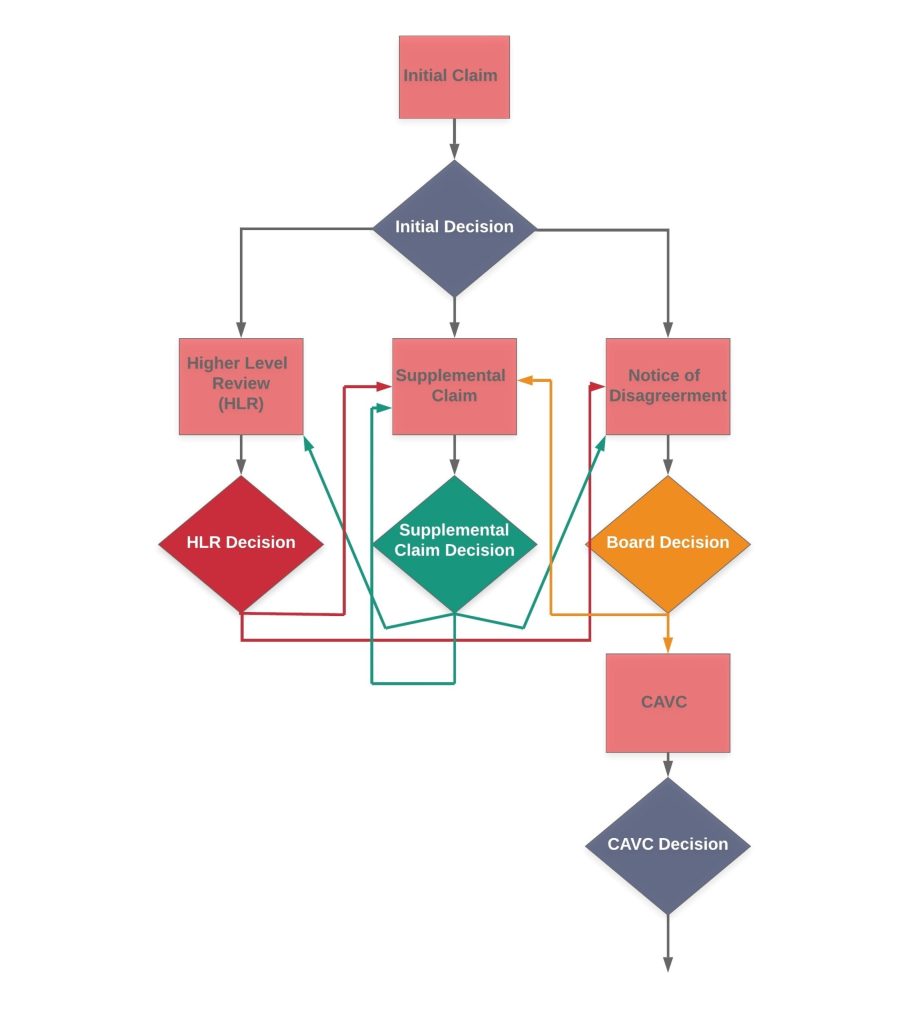A claimant has the right to appeal any benefits decision made by the Veterans Benefits Administration. The VA appeals process is set in law and is different from any other judicial appeals process. Since the process is complex, claimants often obtain a representative to help with the appeal. This representative may be a lawyer, a claims agent, or a Veterans Service Officer.
Currently, there are two separate systems in which VA Appeals are processed: the “Legacy” system and the “AMA” system. The Appeals Modernization Act (AMA) was officially implemented on February 19, 2019. Every new decision decided after that date is under the new program–i.e., the AMA system. While open claims decided before that date are now referred to as “Legacy” claims and processed under the old system. Below is an overview of each.
Legacy VA Claims Appeals Process
- 1. To begin the appeals process, a claimant must file a Notice of Disagreement (NOD) (VA Form 21-0958). Claimants must file a NOD within 1 year of the date on the letter notifying him or her of the claim decision. The claimant can file the NOD by mailing it to the address provided on the VA claim decision letter or by bringing it to a local VA Regional Office. After the VA Regional Office receives the NOD, the claimant will be able to check his or her appeal status online.
- 2. After filing the NOD, a Decision Review Officer will review the evidence related to the appeal, including any new evidence sent. If the Decision Review Officer determines that there is insufficient evidence to grant the appeal, they will send their findings in a document called a “Statement of the Case.” The Statement of the Case will include the decision, the reasons and bases for the decision, and a summary of the claims process thus far. The claimant can then decide whether to continue his or her appeal to the Board of Veterans’ Appeals. To continue the appeal, the claimant will need to fill out Form 9, which will be included with the Statement of the Case. The VA Form 9 must be filed within 60 days of the date of the mailing of the Statement of the Case. (Optional) The claimant can submit new evidence for his or her appeal at any time in the process. If the claimant submits new evidence after receiving a Statement of the Case, the Decision Review Officer will need to write a Supplemental Statement of the Case before sending the case to the Board of Veterans’ Appeals. Once the appeal is sent, the claimant will need to submit any new evidence directly to the Board. The Veterans Benefits Administration will not review any new evidence after the claim has been sent to the Board.
- 3. The Decision Review Officer will finish the review and send the claim to the Board of Veterans’ Appeals. The Board reviews cases in the order received according to the date on the VA Form 9. A judge will begin to review the claim on the appeal when it is among the oldest appeals ready for their review. If the claimant suffers from a serious illness, financial distress, or other sufficient cause (a reason for needing an appeal reviewed faster), the claimant can apply to have his or her appeal advanced on the docket. If the claimant is over 75 years old, his or her appeal will receive this expedited status automatically. “Advanced on Docket” appeals are prioritized so they are always at the front of the line.
- 4. (Optional)
There is the option to request a hearing with a Veterans Law Judge. At the hearing, the judge will ask the claimant questions about the appeal. A transcript of the hearing will be made and added to the appeal file. The veteran’s law judge will not decide on the appeal at the hearing. - 5. The Board reviews the appeal and provides a decision on each issue in the appeal. The Board decides EACH issue in 1 of 3 ways:
- 6. If the claimant disagrees with the Board’s decision, they can appeal to the Court of Appeals for Veterans Claims. The claimant will need to hire a VA-accredited attorney to represent them, or they may represent themselves. The claimant will need to file a Court appeal within 120 days of the Board’s decision.
New VA Claims Under The AMA
- 1. To begin the Appeals process, a claimant must determine which “lane” they should take: (1) Higher Level Review, (2) Supplemental Claim, or (3) Notice of Disagreement to the Board. Determining which “lane” a claimant should take is a complicated decision, which should be done on a case-by-case basis as there are many factors involved. For example, there are different evidentiary requirements for each “lane.” Under Higher Level Review, the VA will not look at any new relevant evidence. Under Supplemental Claim, the claimant must submit “new and relevant” evidence. Under Board review, the claimant may submit new evidence, but the evidence must be submitted within 90 days of the appeal. The claimant may also request a Board hearing.
- 2. Once the claimant has decided which “lane” is best for his or her situation, the claimant should file the correct VA form AND relevant evidence (if applicable). For Higher Level Review, use Form 20-0996. For Supplemental Claim, use Form 20-0995. For Board Review, use Form 10182.
- 3. If the VA denies the claim in any of the three lanes, the claimant has several more options to continue pursuing the claim. This is where it gets complicated. In an attempt to simplify the process at this point, we have created the chart below. You should be able to enlarge the chart by clicking on the image and zooming in.

